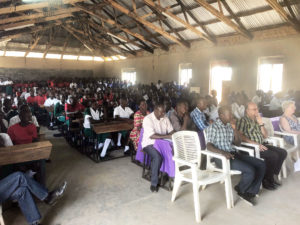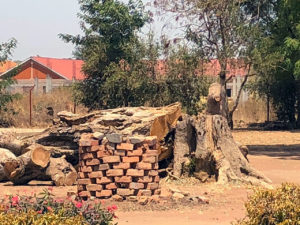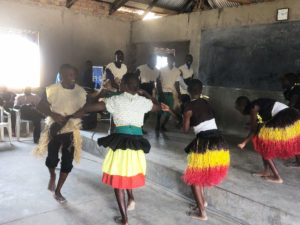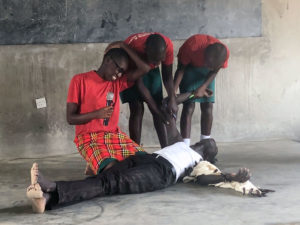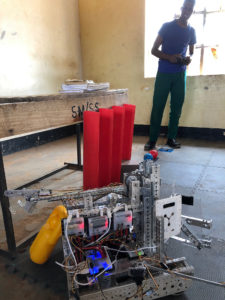The visit to Beacon of Hope is always a high point of any visit here. Founded twelve years ago as a school for war-affected kids, this secondary boarding school now hosts a student body of over 600. A large number of the children are on full scholarship, and nearly all of them come from the villages of Teso. There are six grades, through the senior year in high school. For many of the kids, this is the first time they have been away from home. However, village life can be hard, and in many places there are deep patterns of abuse — alcoholism, domestic violence, disputes over property, as well as the endemic problems of the rural poor, hunger caused by drought or floods and, above all, malaria. Here the children find a stable environment and the guidance of a faculty and staff who see as their first mission the call to love the students no matter what.
Our visit follows a familiar pattern — talking with faculty and administrative staff, and then attending an assembly of the whole student body and their teachers. Over the last ten years this would have taken place under the enormous fig tree which had given shade to every full gathering of the school. Our lack of an assembly hall big enough for all our students to sit for national exams at the same time was a constant threat to our accreditation. The board prayed constantly, yet many of our fundraising efforts did not bear fruit, until in God’s time the donors appeared and the hall was built. As I step into it and see hundreds of children brought together under a real roof, I almost start to cry.
But there is a shadow over the morning. Today there is also an announcement that the head teacher will be leaving to pursue other opportunities. Justin is well loved and has been at the school for ten years, and the news is received with sadness. The adults in the room have to address this.
I talk about the fig tree. Twenty minutes earlier, as we were driving through the gate, the first thing I saw was that the glorious old fig tree had been cut down. I couldn’t believe my eyes. In its place there were only enormous stumps and logs awaiting removal. The tree, I was told, was old and weakening, in danger of dropping its huge branches without warning. It had to be taken down. I tell the children that it is almost impossible for me to think of the school without the tree, but in fact the school continues, because it is not about the tree, not even about the faculty, certainly not about “Papa Bishop,” but about them and about the generations that will follow them. I then ask them to remember the teaching of Jesus. In a moment when his disciples are fighting over who shall be the greatest, the Lord brings a child before them, and says, “Unless you become like this child, you cannot enter the Kingdom of God.” I say to them all, you are that child, chosen and precious in the sight of God, of infinite worth, each with a particular calling and with no limit as to what God can do with you and through you. And we are watching, so that as you grow in grace and love, in wisdom and skill, we can pray that we will become more and more like you.
In addition to my own talk, Betsy gives greetings. She is revered as “Toto,” the Ateso word for “Mama,” and her words of encouragement and warm and gentle spirit are greeted with broad smiles. In addition, there are brief speeches by Henry, the new head of education for Pilgrim Africa and by Solomon, our agriculture director who has had a long-standing relationship with the school. By the end, the kids seem ready to take on the world again.
A group of students, who are called simply “the MDD” (music, dance and drama), have been rehearsing a couple of presentations for the last three days. First, they perform two rousing traditional dances. The wars in the region over thirty years took away many elements of Teso culture, and the MDD program, under the direction of Moses Opio, seeks to re-establish those treasures among the young. The performance brings down the house. Another group performs a little play about a teenage girl whose father is murdered and who is nearly forced into marriage so her family will not be destitute, until the recruiters come from Beacon of Hope and offer her a place at the school.
Two things strike me about this little drama. First, this scenario is not fiction. Any one of our kids could tell you the ways that BOH is a lifeline for them, and I know of more than one case where a dead father and a forced engagement were the immediate background to a child’s admission. Second, the children are able thoroughly to enjoy the whole story. The murderer, the prospective fiancé and his father are played broadly and seem both horrible and somehow ridiculous. The children laugh with scorn at the “bad guys” and cheer the girl! This is a sign of healing. In the early days of Beacon of Hope, it was important to give space for the student to tell the stories of what they endured during the war, and they did it in various ways. At one point we distributed a few dozen inexpensive video cameras to let them make films; at first these were very sober, even dark. But as the kids healed, they discovered their power to control their own narrative, and treating their tormentors as an object of ridicule was an assertion of their own recovery. As I watch this skit play out, I laugh and cheer right along with them.
The morning ends in a neighboring building with an introduction to the robotics program. It is hard to believe that a school with absolutely no luxuries has built a robotics team that is now winning recognition in international competition from New York to Israel. This is also led by Moses Opio and I am awed by the young people who are the backbone of this program. The lead student, Hassan, runs a rather frightening contraption through a series of maneuvers — picking up, tossing, dropping and parking a couple of different objects– all this taking place in a classroom where at one time we stored sunflowers before pressing their seeds into cooking oil, a technology leap across three centuries!
On the way out, we also note a few weak spots. The chem lab is virtually shut down, and needs an injection of fresh chemicals and glassware, and I ask for a list of these and other needed items. There are other matters — some administrative, some strategic — which I mentally note for the board meeting on Saturday.
Then, all too soon, it is time to leave. We say quick goodbyes. We learn later that the results of the national exams called the UCE have just come in. Our scores put us near the top among all the schools in Soroti district.
Most importantly, not a single kid failed.

